

Research Briefings - EU exit: impact in key UK policy areas. The impact of an EU exit in a range of key UK policy areas Trade The EU is the UK’s most important trading partner.
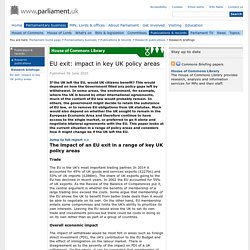
In 2014 it accounted for 45% of UK goods and services exports (£227bn) and 53% of UK imports (£288bn). Research Briefings - Exiting the EU: UK reform proposals, legal impact and al... David Cameron pledged during the previous Parliament that if the Conservatives were returned to government in the 2015 general elections, he would legislate to hold an in-out referendum on the UK’s continued membership of the European Union, following the negotiation and agreement of a number of reforms he had set out in speeches and policy papers.
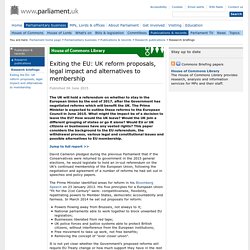
The Prime Minister identified areas for reform in his Bloomberg Speech on 23 January 2013. His five principles for a European Union “fit for the 21st Century” were: competitiveness, flexibility, repatriating powers to Member States, democratic accountability and fairness. In March 2014 he set out proposals for reform: It is not yet clear whether the Government’s proposed reforms will require EU Treaty change or how much support they have in the rest of the EU. David Cameron sought support for his reform ideas among other EU leaders, and launched his reform agenda – briefly - at the European Council on 25-26 June 2015. UK and the EU: Better off out or in? - BBC News. Brexit – what would happen if Britain left the EU? David Cameron’s electoral triumph has brought the prospect of a British withdrawal from the EU one step closer.
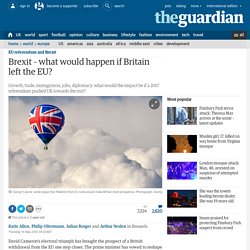
The prime minister has vowed to reshape Britain’s ties with Europe before putting EU membership to a vote by 2017. But what would “Brexit” - a British exit from the 28-nation EU - look like? Eurosceptics argue that withdrawal would reverse immigration, save the taxpayer billions and free Britain from an economic burden. Europhiles counter that it would lead to deep economic uncertainty and cost thousands, possibly even millions, of jobs. Our writers have drawn on the best available expertise to assess what Brexit would mean for growth, jobs, trade, immigration and Britain’s position in the world. Starting with the estimates that leaving would be a net loss to the UK economy, one analysis often cited is from researchers at the National Institute of Economic and Social Research in 2004. Overall, the authors state: But a large dose of caution is needed.
He concluded: Katie Allen. Thatcher and her tussles with Europe - BBC News. Margaret Thatcher's tussles over Europe and the UK's role in what is now the European Union were among the defining moments of her premiership.
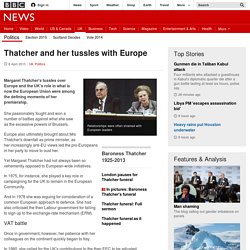
She passionately fought and won a number of battles against what she saw as the excessive powers of Brussels. Europe also ultimately brought about Mrs Thatcher's downfall as prime minister, as her increasingly anti-EU views led the pro-Europeans in her party to move to oust her. Yet Margaret Thatcher had not always been so vehemently opposed to European-wide initiatives. In 1975, for instance, she played a key role in campaigning for the UK to remain in the European Community.
And in 1978 she was arguing for consideration of a common European approach to defence. VAT battle Once in government, however, her patience with her colleagues on the continent quickly began to fray. In 1980, she called for the UK's contributions to the then EEC to be adjusted, warning that otherwise she would withhold VAT payments. 'No. "No. It was too much for some. Britain and the EU: A long and rocky relationship - BBC News.
Image copyright Thinkstock The United Kingdom's relationship with the EU - or, in political parlance, "Europe" - has long been one of the most divisive, emotive issues in British politics.
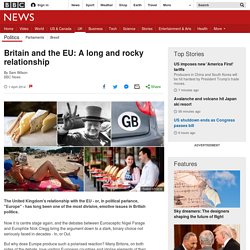
Now it is centre stage again, and the debates between Eurosceptic Nigel Farage and Europhile Nick Clegg bring the argument down to a stark, binary choice not seriously faced in decades - In, or Out. But why does Europe produce such a polarised reaction? Many Britons, on both sides of the debate, love visiting European countries and idolise elements of their culture - not least the food. Indeed, more than 1.5 million Britons have moved there to live. But Europeans viewing British newspaper coverage, political debates or opinion polls would be forgiven for thinking we have little but contempt for our neighbours.
Britain's 40 year relationship with the EU.